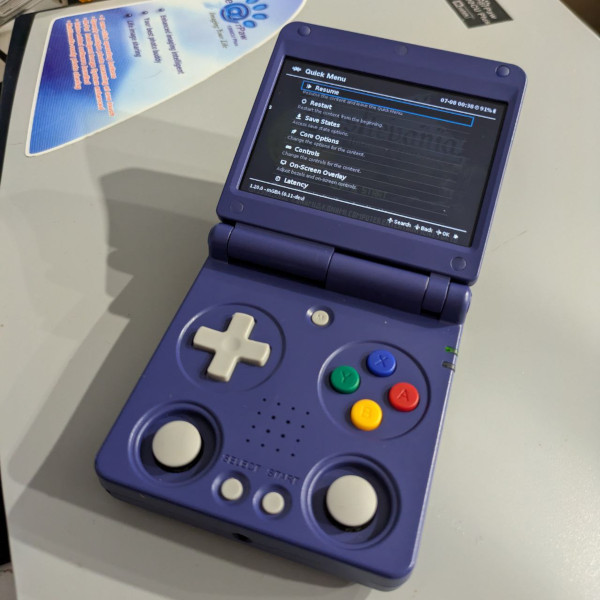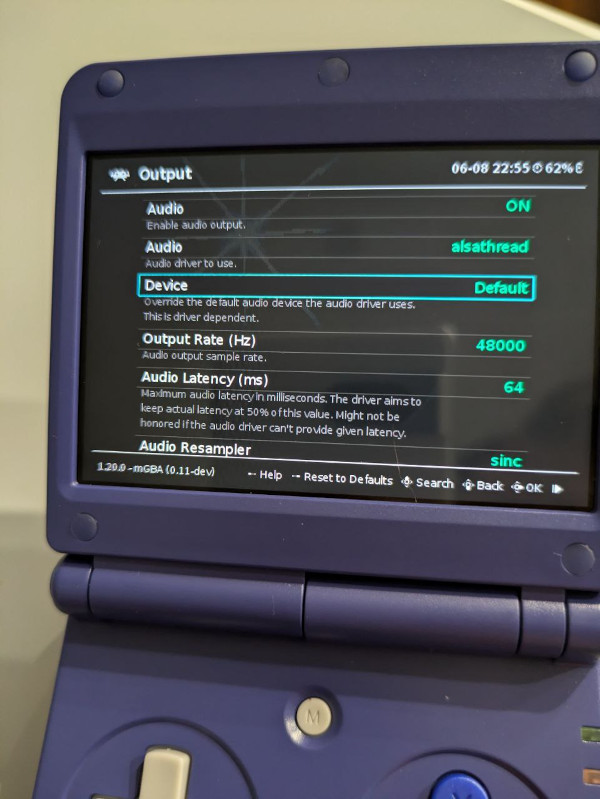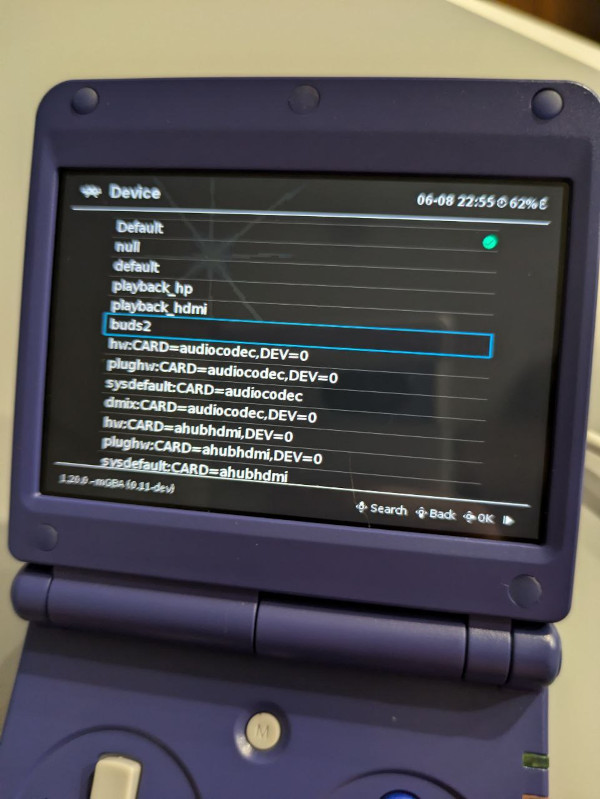Making bluetooth headphones work with ANBERNIC RG-34XXSP
Introduction
Initially I wanted to buy Game Boy Advance SP, but after studying some details and looking at its price, I decided to look for a new portable console that can emulate it, which would be as similar to it as possible. I chose ANBERNIC RG-34XXSP.
During use, I encountered the fact that it is impossible to use Bluetooth headphones on the standard firmware. When trying to connect, I was simply thrown into the Bluetooth settings menu!
I have researched this issue and found some workaround. But this workaround will work ONLY for RetroArch other apps will still output audio to the built-in speaker.
 |
 |
| Game Boy Advance SP | ANBERNIC RG-34XXSP |
Causes of bluetooth issue
By default, ANBERNIC RG-34XXS has Ubuntu 22.04 (Jammy Jellyfish) installed and the SSH daemon is running (user and password: root, standard port 22).
Since I couldn’t connect via the UI, I connected via SSH.
[TIP] Disable Lock Screen in the settings, otherwise the ssh-connection will hang when the screen is locked.
And used the bluetoothctl utility from the bluez package to connect the headphones manually:
bluetoothctl# scan on
[CHG] Controller 68:8F:C9:6B:BF:9C Discovering: yes
[NEW] Device 18:26:54:B6:23:CE Galaxy Buds2 (23CE)
bluetoothctl# trust 18:26:54:B6:23:CE
bluetoothctl# pair 18:26:54:B6:23:CE
bluetoothctl# connect 18:26:54:B6:23:CE
The connection failed and I got an error:
Failed to connect: org.bluez.Error.Failed br-connection-profile-unavailable
In general, this is the main reason why the connection does not occur through the UI.
Solution to the issue with bluetooth
I found out that the system does not use pulsaudio, and only alsa is available. I also found out that for bluez to work with alsa with Bluetooth, the bluez-alsa daemon is required to be running. But since it is not in the system, you will have to install it.
[IMPORTANT] Before installing the package, set the time and date correctly and, just in case, the time zone. If you haven’t done this yet, you can use the timedatectl utility:
Get a list of time zones:
timedatectl list-timezonesSet the desired time zone, for example
Europe/Berlin:timedatectl set-timezone Europe/BerlinSynchronize date and time with the Internet:
timedatectl set-ntp trueOr set it manually via parameter
set-time.You may also need to update the
ca-certificatespackage. Otherwise, you will get an error fromaptlike this:Certificate verification failed: The certificate is NOT trusted. The certificate chain uses not yet valid certificate. Could not handshake: Error in the certificate verification.
Now install bluez-alsa-utils:
apt update
apt install bluez-alsa-utils
Add the daemon to startup and run it:
systemctl enable bluez-alsa
systemctl start bluez-alsa
Now try the bluetoothctl utility again as described in the Causes of bluetooth issue section. But this time the error should not appear.
This should also work in the UI now.
Adding a new sound device
Now after a successful connection, you need to add a new device for alsa (unfortunately, the configuration for each new headphone will have to be entered manually, so far I have not found another way).
Display available Bluetooth audio devices:
bluealsa-aplay -L
Copy what you need.
[WARNING] Before making changes to configuration files, make backups of them!
Open /etc/asound.conf in a text editor (in my case it’s nano):
nano /etc/asound.conf
And add to the end of the config:
pcm.buds2 {
type plug
slave.pcm "bluealsa:SRV=org.bluealsa,DEV=18:26:54:B6:23:CE,PROFILE=a2dp"
}
ctl.buds2 {
type bluealsa
}
Where the value slave.pcm is the needed device obtained from bluealsa-aplay -L and buds2 is a custom name for your device.
[IMPORTANT] I also recommend using
alsamixerto set the headphone volume to100%, since RetroArch will still only adjust it in software. The device will probably not show up inalsamixer. Therefore, press F6 in its TUI and select enter device name….
Now run the test. If everything is done correctly, then the phrases Front Left and Front Right should be heard in turn in the corresponding earphone:
speaker-test -t wav -D buds2 -p 10 -c 2
RetroArch Fix
After all these manipulations, your headphones should now appear in the RetroArch settings. However, there will be no sound played in them (how unexpected).
 |
 |
Using logging I found out that RetroArch requires /usr/lib/arm-linux-gnueabihf/alsa-lib/libasound_module_pcm_bluealsa.so.
This can be fixed by installing the package libasound2-plugin-bluez:armhf:
dpkg --add-architecture armhf
apt update
apt install libasound2-plugin-bluez:armhf
After that, restart RetroArch and select your headphones in the settings. And the sound should appear.
Known Issues
- Sometimes when loading the device
bluez-alsathe daemon terminates and the issue with Bluetooth appears again (the reason is not clear yet, it can be fixed by rebooting); - In RetroArch
alsadevice is not saved on restart (seems to be a ANBERNIC or RetroArch issue); - Headphones won’t automatically connect to portable console (ANBERNIC issue).